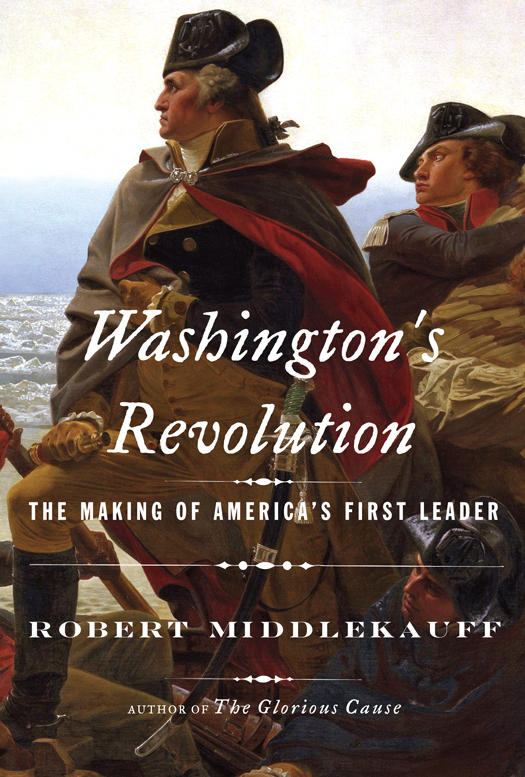
Washington's Revolution
The Making of America's First Leader
کتاب های مرتبط
- اطلاعات
- نقد و بررسی
- دیدگاه کاربران
نقد و بررسی

December 15, 2014
Middlekauff (Benjamin Franklin and His Enemies), an acclaimed historian of early America, shows how, from the 1760s to 1783, Washington went from being a “Virginia provincial” to a national leader, one who “held together the political structures that constituted the United States” by integrating state militias. He devotes about one quarter of his book to the French and Indian War, and three quarters to the Revolutionary War. During the latter, Washington complained repeatedly to the Continental Congress of a shortage of supplies and lost more battles than he won. But he kept the colonies in the war through daring triumphs at the Battles of Trenton and Princeton, responded with equanimity to criticism when campaigns went badly, and showed great “strategic sense” in choosing to fight a war of attrition. Middlekauff praises Washington’s commitment to civilian supremacy in directing military policy and demonstrates how Washington came to be seen as “a creature apart... a chosen instrument of providence.” Though he glosses over some noteworthy events, Middlekauff’s clearly written study supports the view of Washington as a military leader who was as adept at working with ordinary soldiers as he was with querulous political leaders, revealing how much of Washington the legend was reflected in the real man.

December 1, 2014
Bancroft Prize winner Middlekauff (Emeritus, American History/Univ. of California; Benjamin Franklin and His Enemies, 1996, etc.) sets out to chart the evolution of George Washington's viewpoint during the crucible of the Revolutionary War."At its beginning, [Washington] was a provincial," writes the author, "and during its course he became an American. But he was a most unusual American by war's end: He was an established citizen of the world." Although an engaging concept, the author's thesis proves to be unsupported by the text. Washington certainly thought of himself primarily as a Virginian, but Middlekauff demonstrates that as early as 1775, he "wished in effect to erase state lines...to banish provincialism in favor of unity," at least within the army. While Washington recognized that French support was indispensable to American victory and thus made great efforts to flatter and cajole French commanders into serving his purposes, nothing appears to suggest that Washington was then considering the place of an independent America among the world's nations or was otherwise adopting a broadly internationalist viewpoint officially or personally. Middlekauff delivers a comprehensive if uncritical review of the war in the theaters in which Washington exercised day-to-day command. His ability to form and reform a perpetually dissolving army in the face of appalling privation made him indispensable to the cause, and the author emphasizes his consistent adherence to the principle of civilian control of the military, an attitude critical to the subsequent development of the republic. But Middlekauff offers few glimpses into the character of Washington as a fallible mortal with an evolving perspective; the image of him that predominates is the familiar one of the austere warrior, "a man set above all others, a unique being-not a god, but at the least a chosen instrument of Providence." A capable Revolutionary War history that breaks no new ground.
COPYRIGHT(2014) Kirkus Reviews, ALL RIGHTS RESERVED.

Starred review from February 1, 2015
Since the inception of the Papers of George Washington Project in 1968, a vast array of new material about America's first president has come to light. A consequence of the project has been the publication of many topical studies about Washington, such as The Ascent of George Washington by John Ferling and "Mr. President" by Harlow G. Unger. Here Middlekauff (emeritus, history, Univ. of California, Berkeley; The Glorious Cause: The American Revolution, 1763-1789) explores the future president's evolution as a leader from his time as a young Virginian through his successful military leadership of the Continental Army during the American Revolution. Washington grew from holding a provincial world view to having a mixed, complex understanding of his world. By the end of the revolution, he was well positioned to assume preeminent political leadership of a new nation, first as president of the Constitutional Convention in 1787 through 1788 and then as the first U.S. president. Between 1732 and 1784, he transitioned from a Virginian to an American to a world citizen. He became a nationalist without discarding the ethos of his native land. VERDICT Focused and succinctly written, this biography will be of interest to readers and scholarsof Washington and of the American Revolution.--Glen Edward Taul, Campbellsville Univ. Libs., KY
Copyright 2015 Library Journal, LLC Used with permission.

January 1, 2015
Focusing on George Washington's significant impact on the course and outcome of the Revolution rather than on his role as America's first president, Middlekauff details the life and times of both the man and the soldier. Beginning with his formative years, the author charts the course of his remarkableyet thoughtfully measuredtransformation from provincial Virginian to nationalist leader. Comparing the evolution of Washington the man to the fledgling nation, the author is able to capture the collective mind-set of a people perched on the precipice of a monumental historical shift. Wrapping up his study at the conclusion of the war, the author portrays Washington, like the nation he represented and fought for, as a man with an entirely new conception of what freedom meant in a free nation. Although biographies of GW abound, Middlekauff's psychological and philosophical approach adds some fresh new details to a time-honored portrait.(Reprinted with permission of Booklist, copyright 2015, American Library Association.)

























دیدگاه کاربران